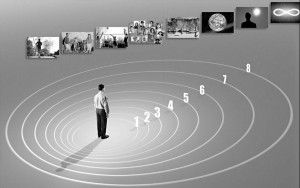 Jefferson Hawkins was once the top marketing executive for the Church of Scientology and helped it reach its greatest extent with the famous “volcano” TV ads in the 1980s. He’s told his tale of getting into and out of the church with his excellent books Counterfeit Dreams and Leaving Scientology, and he’s helping us understand the upside-down world of Scientology “ethics.”
Jefferson Hawkins was once the top marketing executive for the Church of Scientology and helped it reach its greatest extent with the famous “volcano” TV ads in the 1980s. He’s told his tale of getting into and out of the church with his excellent books Counterfeit Dreams and Leaving Scientology, and he’s helping us understand the upside-down world of Scientology “ethics.”
Last week you really started this series off with a bang, Jefferson. We can’t wait to see what you have for us in this second installment as we read Introduction to Scientology Ethics.
JEFFERSON: This week, I thought we’d take up the next three sections of the book, up to the end of Chapter One. These all kind of hang together and serve to introduce a major lynchpin of Hubbard’s ethics system, “the greatest good for the greatest number of dynamics.”
THE BUNKER: That’s a timely subject. We were just hearing in court yesterday about how the Church used that rationale to convince Laura DeCrescenzo to have an abortion at only 17.
JEFFERSON: Exactly. And Hubbard leads us into it gradually. The first section is an interesting one, called “Gradient Scales of Right and Wrong.” Hubbard probably has the honor of being the first to apply multi-valued or “fuzzy” logic to the subject of ethics. His premise is this: There can be no such thing as absolute right or absolute wrong. He concludes:
Terms like good and bad, alive and dead, right and wrong, are used only in conjunction with gradient scales.
In other words, you may think you know what is right and what is wrong, but you don’t. It’s “fuzzy.” The only answer, therefore, to the question, “is it wrong to do this?” is “it depends…”
THE BUNKER: Depends on what?
 JEFFERSON: Well, he’s getting to that. The next section, “The Dynamics of Existence” is just a standard rundown of the Eight Dynamics.
JEFFERSON: Well, he’s getting to that. The next section, “The Dynamics of Existence” is just a standard rundown of the Eight Dynamics.
THE BUNKER: Let’s review them quickly for the newcomers. L. Ron Hubbard divided the cosmos into a gradient scale that he called “dynamics.” They are: 1. Self, 2. Family/Sex, 3. The Group, 4. Mankind, 5. Animals and other living things, 6. Physical universe, 7. Spirit, 8. God or infinity. We noticed that in the current edition, the Second Dynamic is listed as “Creativity.” The Church is moving the definition away from everyone’s favorite subject: hot sex.
JEFFERSON: I believe this was the first time that new definition was used. So now we get to the meat of the chapter, which is “Ethics, Justice and the Dynamics.” This is taken from a Policy Letter that, as Dan Koon pointed out last week, is a compiled issue, in other words, someone put it together from bits and pieces of Hubbard’s writings and lectures.
THE BUNKER: Does that mean it wasn’t written by Hubbard?
JEFFERSON: Well, to be clear, it doesn’t mean that the compiler just invented stuff. I know from personal experience that these compilers were on a very tight leash. They had to document that every sentence came from Hubbard’s writings; they were never allowed to just make stuff up. This section is long and rambling, but contains the first tentpole of Hubbard’s system, “the greatest good for the greatest number of dynamics,” or as he states it:
An optimum solution to any problem would be that solution which brought the greatest benefit to the greatest number of dynamics.
THE BUNKER: That sounds pretty logical.
JEFFERSON: Sure — it sounded logical to Jeremy Bentham (1748-1832), when he first floated the idea of “the greatest good for the greatest number.” (Hubbard of course does not credit Bentham.) Jeremy Bentham is considered the father of what is called utilitarian ethics, and anyone who has been indoctrinated into Scientology ethics would do well to study that subject.
Utilitarian ethics is based on the idea that the rightness or wrongness of an action can only be judged by its end result. It has been shorthanded as “the end justifies the means.” Hubbard argues as follows:
It happens that no construction can take place without some small destruction, just as the tenement must be torn down to make room for a new apartment building…To be good, a thing must contain construction which outweighs the destruction it contains. A new cure which saves a hundred and kills one is an acceptable cure.
THE BUNKER: Not to the family of that one person, of course.
JEFFERSON: Exactly — and we are getting into the flaws of utilitarian ethics. But get what he has done here. He has convinced us that there is no absolute right and wrong, that it is a slippy-slidey moral gray scale. To determine what is right and wrong, one must do a numbers game, a sort of moral cost-benefit analysis, balancing the good results of an action against its bad results, across eight dynamics. And when you think about that, and all of the ramifications involved, you see that’s pretty much an impossibility.
THE BUNKER: So what are the flaws in utilitarian ethics?
JEFFERSON: There have been a lot of criticisms of utilitarian ethics by people a lot smarter than I am, but let me lay out what I see as the major faults of this sort of system, particularly as it relates to Scientology.
First, who gets to define what is a good result and what is a bad result? One of the major faults of utilitarian ethics is that it is often pushed by religious groups, political groups or even corporations who have an agenda and who define “good” and “bad” according to their own ideology, beliefs and prejudices. And it’s often used to justify actions which would ordinarily be thought of as immoral.
I’m sure Adolf Hitler thought he was working for the “greater good” of a pure Aryan race when he slaughtered Jews. We’ve seen governments justifying torture because of the “greater good” of security against terror. We’ve seen fast-food chains justify paying poverty-level wages to achieve the “greater good” of maximizing profits for their stakeholders.
Second, it sets up a false premise that in order to achieve a “good,” you have to sacrifice or compromise other “goods.” “You can’t make an omelet without breaking some eggs” sort of idea. This justifies pretty much anything — lies, manipulation, coercion — as long as the “good” end is achieved.
THE BUNKER: Well, Scientologists certainly get used to the idea of sacrificing for the greater good.
JEFFERSON: Yes, as this system relates to Scientologists, I think “sacrifice” is a key word. Specifically, Scientologists are expected to sacrifice First and Second Dynamic goals in order to forward Third and Fourth Dynamic goals — as conceived and defined by Scientology.
There was a propaganda ad that Hubbard wrote and tacked on to the beginning of one of the Tech Films that epitomizes this thinking. It showed a man and a woman holding each other against a moonlit sky. As the camera panned around them, it showed they were starving and in rags, huddled in the ruins of a city. The voice-over said “If you concentrate on the First and Second Dynamics…that’s all you’ll have left.” Scientologists are gradually convinced that being “First Dynamic-oriented” or “Second Dynamic-oriented” is looked down on and despised as selfish and self-centered. The man who buys a new car for his family instead of a down-payment on his next auditing intensive is sent to Ethics. The staff member who requests a leave of absence to attend a family wedding is looked down on and harassed.
The fact is, even if a person actually went through the mental gymnastics of calculating out the benefits and the harm of every action across all dynamics, if their ultimate conclusion is wrong in the eyes of the Church, they will be forced to see it the Church’s way, or else face discipline.
THE BUNKER: So how would you characterize Scientology’s ethics system so far?
JEFFERSON: I ran across an interesting reference when researching this chapter, something called “state consequentialism,” a Chinese system dating back to the 5th century BCE, which held that an action is right if it benefits the state, particularly in terms of order, material wealth, and increase in population. I’m probably shorthanding that terribly, but it occurs to me that the Scientology ethics system could really be described as “Church of Scientology consequentialism.” An action is only considered “ethical” if it benefits the Church in terms of money, property, or good PR.
THE BUNKER: The Chinese have the I Ching. The Church of Scientology has Ka-CHING.
——————–
Mark Bunker and Tory Magoo
After we ran into these two at Los Angeles Superior Court yesterday, they made this fun video…
——————–
Posted by Tony Ortega on October 24, 2013 at 07:00
E-mail your tips and story ideas to tonyo94@gmail.com or follow us on Twitter. We post behind-the-scenes updates at our Facebook author page. Here at the Bunker we try to have a post up every morning at 7 AM Eastern (Noon GMT), and on some days we post an afternoon story at around 2 PM. After every new story we send out an alert to our e-mail list and our FB page.
If you’d like to help support The Underground Bunker, please e-mail our webmaster Scott Pilutik at BunkerFund@tonyortega.org






